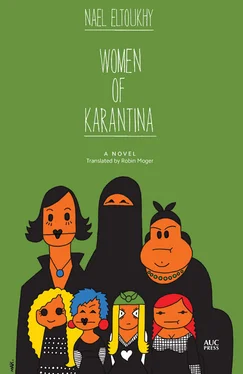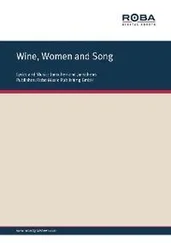As the battle rages, Amira comes up to Yara. Says, Forgive me, sister, you know how much I love you, and Yara pats her hair. Amira gets down on her knees and kisses Yara’s bulging belly. She trills happily, My little chick, my little dear. My sweetheart. What a darling. With tears in her eyes, she looks at Yara and asks, What will you call him, sister? and Yara says, Abdallah, then points at Amira’s belly and says, And you’ll be blessing us all with his little sister in no time.
Afriqi is sitting on the ground beside Lara. He says, With God’s help, sister, no one will be able to get near us. We’re nice and safe. And Lara grasps his hand and kisses his fingers one by one, then looks at him and says, Why are you so lovely? My boy, don’t make me fall for you now. And they laugh.
The sunset prayer is called and the Interior’s armored trucks, or what remains of them, gather up the corpses of the soldiers that litter their flatbeds, and withdraw. Yara and Lara and Amira are alone in the tunnel, now that Afriqi and Kama Sutra have left. When the last truck has disappeared for good, each looks at the others, and all together, all at once, they pull out their phones and dial. It’s impossible not to notice. Each looks at the others and they all smile at the same time, at the very same time, as the place where they stand rocks with a mighty explosion, as each of them throws herself down on the gravel and tries to crawl anywhere and everywhere, as down in the tunnel the blood of four people flows, the blood of three women and an unborn child. Suddenly, a woman’s scream rings out: God grant me victory over you both, you pair of scumbags. . Which of the three women gave this cry, no one knows or cares. Why should they? A dying person doesn’t care about details of this kind.
Sheikha Salha performs the evening prayer with the women in the mosque, then the prayer for the souls of the martyrs who fell in battle. She leaves the mosque with Umm Salah the maid. The neighborhood is utterly destroyed. The tunnel gapes, its roof caved in by the six massive explosive charges sown along its length. For the first time in a long time, the residents can see the tunnel underground, exposed to the air above.
Sheikha Salha notices the corpse of a dog next to the ruined tunnel. She picks it up in her hands and tosses it into the pit. Smiling, she turns to Umm Salah. Even the animals, ya hagga: they intercede for our souls if they’re buried properly.
They walk on together, Sheikha Salha and Umm Salah, into the heart of Karantina, formerly Sousou’s Karabantina. God have mercy on their souls, Umm Salah whispers and Sheikha Salha replies, A thousand times over. They gave comfort and were comforted. Yehya Volcano is wandering off along the road from the mosque to the café. The only one to be spared the slaughter. Umm Salah considers, then nudges Sheikha Salha. Sheikha Salha looks at him and twists her lips. Climbing the stairs to Sheikha Salha’s apartment, Umm Salah feels that she has been set free, that a vast load has been lifted from her shoulders. She feels weightless, feels a desire to soar over the rubble of Karantina. She hasn’t felt this way for twenty years, she thinks, since 2044, when Hamda died, and Sousou, and the men. She smiles at a sudden shameful thought: that she’s reveling in the misfortune of others. She looks over at the sheikha and finds her smiling contentedly as well. Asks, Haven’t we got a conscience, or what, ya sheikha? And the sheikha laughs. Upstairs in the apartment, with the Quran’s Verse of the Cow playing in the background, steam rising from their cups of scalding tea, Sheikha Salha whispers, The Lord is kind to those who serve Him.
Together they drink their tea and ponder the inner peace that has descended, without warning, over the whole world.
aza:Roughly analogous to a wake, where friends and relatives gather to pay their condolences to the bereaved family.
basbousa:Flat, dense cake of baked semolina soaked in sweet syrup.
basha:Arabic rendering of the Turkish term pasha, formerly denoting high rank, but used here as an informal term of respect. Appended to a name (i.e. Ali Basha) it conveys a slightly more formal sense of social superiority.
bashmuhandis:Literally “chief engineer,” the term is most often used as an all-purpose term of respect in the same manner as basha.
bey:Another Arabic rendering of a Turkish title, bey derives from beg, but is once again a term of respect often appended to a person’s name.
Fatiha:The first chapter of the Quran, customarily read as a preliminary to concluding a deal or partnership, and to seal an engagement. The term is also used of prayers said for the dead.
fatta:The Egyptian dish of this name consists of rice and beef or lamb layered with crisped bread and cooked in vinegar and a garlicky tomato sauce.
fuul:Properly fuul midammis, this is a pungent broad bean stew.
gallabiya:The classic Egyptian full-length robe. The gallabiya has working-class and rural overtones, often positive ones associated with ideas of authenticity and traditional values.
hagg/hagga:Literally meaning someone who has been on pilgrimage to Mecca, hagg (or hagga for women) is a term of respect that acknowledges seniority in years and social status.
harisa:Cake-like sweets made with flour, butter, and sugar.
iftar:The meal eaten after a day of fasting during the month of Ramadan.
khimar:One of the more extensive veils for women, covering the head and shoulders and at least the upper chest area.
kunafa:A flat dish made of fine noodles cooked in butter and then soaked in syrup and topped with nuts.
kushari:An Egyptian staple of lentils, pasta, and rice, topped with tomato and garlic sauces and fried onions.
Laylat al-Qadr:“The night of power,” on which the first verses of the Quran were revealed to Mohamed, it falls at the end of Ramadan every year. Referred to as “better than a thousand months” in the Quran, prayers offered on this night are supposed to be more effective.
mabrouk:“Congratulations.”
mulukhiya:A soup-like stew made from chopped mulukhiya leaves (tossa jute, or Jew’s mallow), cooked in broth and served with meat and rice.
munaqqaba:A woman wearing the niqab.
niqab:A veil that covers the head and face, except the eyes, a symbol of overt piety.
umda:A village or local “headman” or mayor.
rakaa:Here, the term refers to the set of actions that constitute a single “unit” of Islamic prayer.
saagh:An obsolete military or police rank roughly equivalent to “major.”
taar:A debt of honor calling for vengeance.
Teta:An affectionate term for grandmother.
yuzbashi:Another obsolete rank, one below saagh and roughly equivalent to “captain.”












